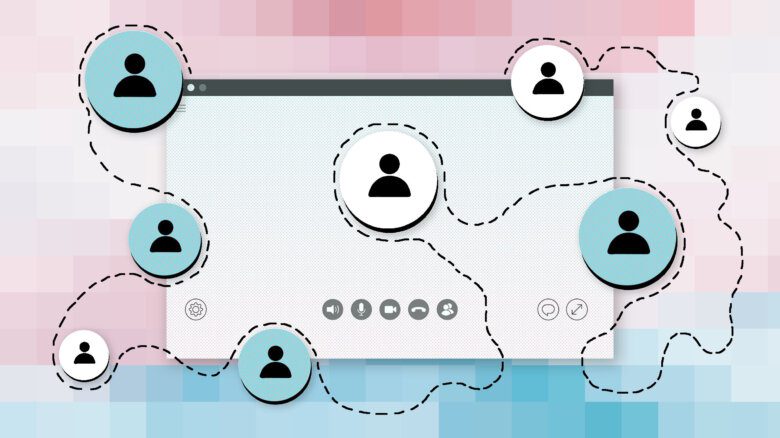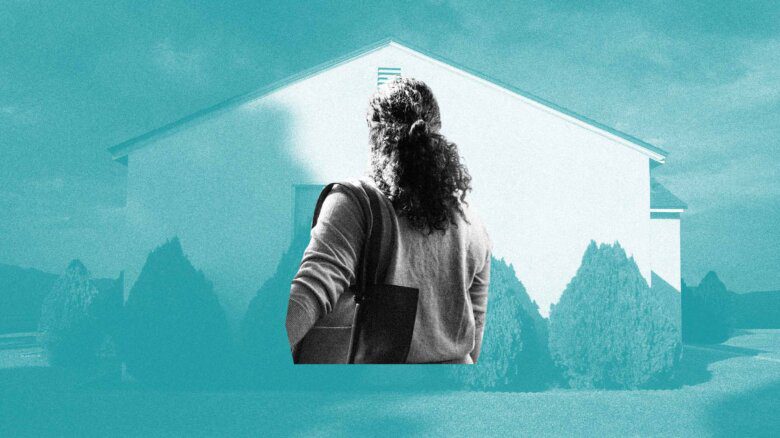For the longest time, I found myself distanced from Islam, unsure if the religion truly accepted and loved me. It often felt punitive, shaming me for how I dressed, for my “rebellious attitude” and even for dabbling in music and performance art. To this day, the Islam communicated to me by my family is like an ever-changing chess game with rules I can never quite pin down.
It’s a dance that Pakistani-Canadian musician Urvah Khan knows all too well. In the summer of 2023, Khan was tasked with curating Muslim Pride, a showcase of queer Muslim artists at Buddies in Bad Times Theatre in Toronto. She was keenly aware of the complications around even discussing the two intersecting identities.
“When I first brought up Muslim Pride to my community mentors, everyone warned me of the severe homophobia, transphobia and Islamophobia that I and other participating artists would be subjected to,” Khan says. “They literally thought I was insane.”
The anticipated backlash is understandable given the social landscape many queer Muslim people navigate.
In September 2023, the two identities clashed as protests for the 1 Million March 4 Children surged across the country. This march, held under the banner of “protecting” children from early exposure to different genders and sexual identities, has spread misleading information about queer and trans people. It also spurred many counter-protests in response.
At a counter-protest at Queen’s Park in downtown Toronto, Summeiya Khamissa, a gender-fluid activist and founder of the Queer Muslim Network, tells me that they saw “school buses filled with kids in hijab.” Many of these kids carried signs with phrases like “Teach ABC not LGB” and “Please don’t take me from my family.”
“It was the most aggressive protest I’ve ever been to,” they say. “There were so many Muslims. I was really really shocked at the sheer number.”
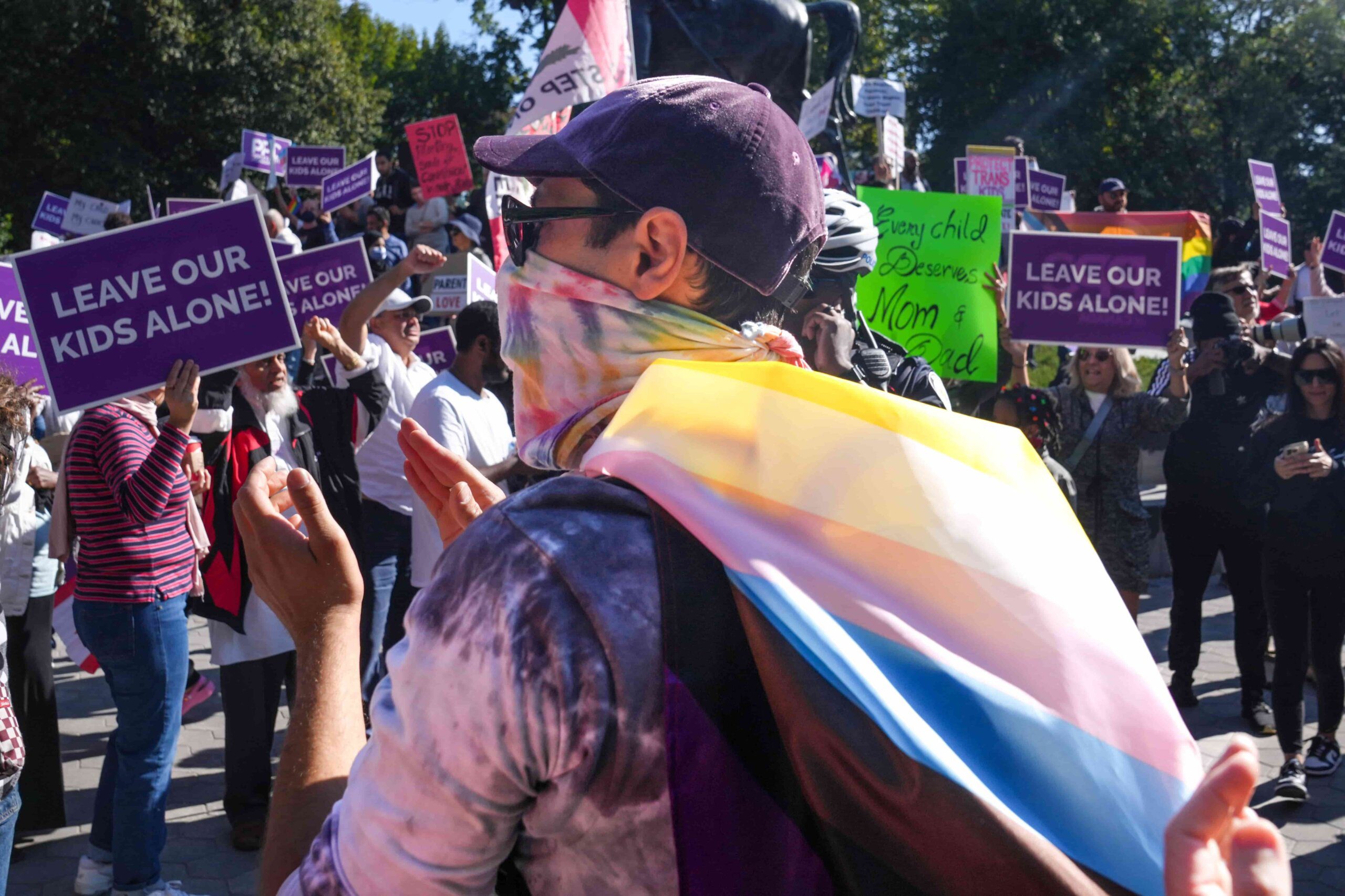
Protestors and counter-protestors in Toronto during the so-called 1 Million March 4 Children on Sep. 20, 2023. Credit: Chris Young/The Canadian Press
In the last year, the Islamic community has grown more and more polarized on queer and trans inclusion or, rather, as it’s often phrased: “the issue,” “the crisis” and “the problems” of queerness in Islam.
Earlier, in May, a number of North American Islamic scholars issued a joint statement hoping to address queer activism during the upcoming Pride Month in June, arguing that peaceful coexistence does not mean that Muslims need to morally agree with—or even be accepting of—LGBTQ2S+ folks.
The opening paragraph reads: “We reject the notion that moral disagreement amounts to intolerance or incitement of violence.” This statement now bears over 100 signatures from across Canada and the United States.
And while this one letter doesn’t speak for an entire demographic, it’s alarming that being queer is framed by some prominent community members as a moral concern to begin with.
In the face of these challenges, Khan, alongside other queer Muslim community organizers, envisions a transformative counter-narrative.
“I figured … what if there were so many of us under the banner of Muslim Pride that the fear was no longer there? If people could all come together in numbers and own their existence, then we could find acceptance in our own communion,” Khan recalls thinking.
Growing up in Karachi and Abu Dhabi and then eventually moving to Scarborough’s Flemingdon Park at the age of 15, Khan felt a lack of role models she could relate to—female rockers, queer icons or outspoken South Asian voices. Somewhere along her journey, this lack of representation meant she herself didn’t have a road map on how to be South Asian, queer and Muslim.
“As a result, I was hiding my Muslim-ness. If Islam was gold, I didn’t think I was pure enough to touch it,” she says. “But I didn’t want to run away from it anymore, and I didn’t want other people to run away from it either.”
On June 15, 2023, Muslim Pride opened at Buddies in Bad Times Theatre, welcoming to the stage artists, poets, drag performers and creatives of diverse backgrounds.
MC-ing the show was Amuna Ali, an immigrant of Somali and Yemeni descent, and associate director at the Marginalized Majority, a local non-profit advocacy and support group for queer people of colour.
“Right now, at this moment, my inner child feels healed,” she told the audience, with a beaming smile on her face.
“I’ve made it my mission to create space for queer Muslims, safe spaces to be so gay and also to be authentic to our culture. Like, we love Whitney Houston, but there is more to our queerness than just Western representations of queer expression,” she said.
Later, as we chat over Zoom, I ask her how she reconciles the supposed oxymoron of being a queer Muslim.
In response, she emphasizes that the patriarchal influence within religious interpretation has shaped the way faith is understood.
“The people who campaign against Pride or Muslim Pride are not God’s messengers who are communicating something we don’t know. They are reckoning with their grief and their incapacity to show up the way we are. I see them not as villains, but as victims of the patriarchy who have not found a way out of their victimhood,” she says.
To Ali, God (or, as she prefers to say, “Goddess”) is not a patriarchal figure, but the people who claim to convey religious messages are.
Khan echoes this view as well, noting how language, historical context and cultural barriers play a role in the interpretation of scripture.
“These texts are written in an older Arabic dialect. I can read it but not understand it. And the more I consider it, unless I learn the language and familiarize myself with all the historical debates, my take is always going to be something someone else puts in me,” Khan says.
Considering that most mainstream Islamic scholarship is in fact undertaken and taught by men, it’s unsurprising that what we know as standardized practices are infused with a level of misogyny and patriarchy.
Emerging as a common thread among queer Muslim community organizers is the significance of personal agency and autonomy in shaping one’s relationship with faith. This idea is especially underscored by Ali, who experienced abuse in connection to religion.
“I lived through a lot of physical violence in the name of faith and religion, in the name of Islam. And that catapulted me out of [faith] by age 12. But I still had to continue performing Islam until well into my 20s,” she says.
Ali’s story sheds light on the complex dynamics that can exist within religious contexts, where faith becomes entangled with familial expectations, personal trauma and violence. Her story furthermore highlights the need for healing and introspection to reconcile these experiences with one’s faith journey.
Karimah Rahman, the founder and curator of the Muslim Indo-Caribbean Collective, a support group dedicated to centring multiple intersectional truths, believes that one of the ways toward healing is finding spaces that mirror our experiences. Rahman, who identifies as a grey-asexual woman with a multifaceted ethnic identity, created the collective precisely so that voices similar to hers could find validation and be heard.
“Being ace and Muslim and Indo-Caribbean, I didn’t even have the words to explain who I was,” she says. “I didn’t even know it was possible to be all those things. I genuinely did not think asexuality existed for Indo-Caribbean people because I had never seen it in action.”
Her words hit home. I recall how emotional and rare it was to see parts of myself reflected in the world around me. At queer Muslim events, I often find myself practically swooning when I see brown people dressed in traditional Pakistani clothing, holding hands without the awkward, fumbling, “no homo” schtick.
During the Muslim Pride showcase, I wanted to simultaneously cry and cheer when Iranian-Canadian burlesque artist Ola Minou commanded the crowd in chanting “Woman. Life. Freedom,” referencing feminist uprisings in Iran while unapologetically owning her body on stage. I could feel within the audience a yearning and camaraderie instantly coalescing.
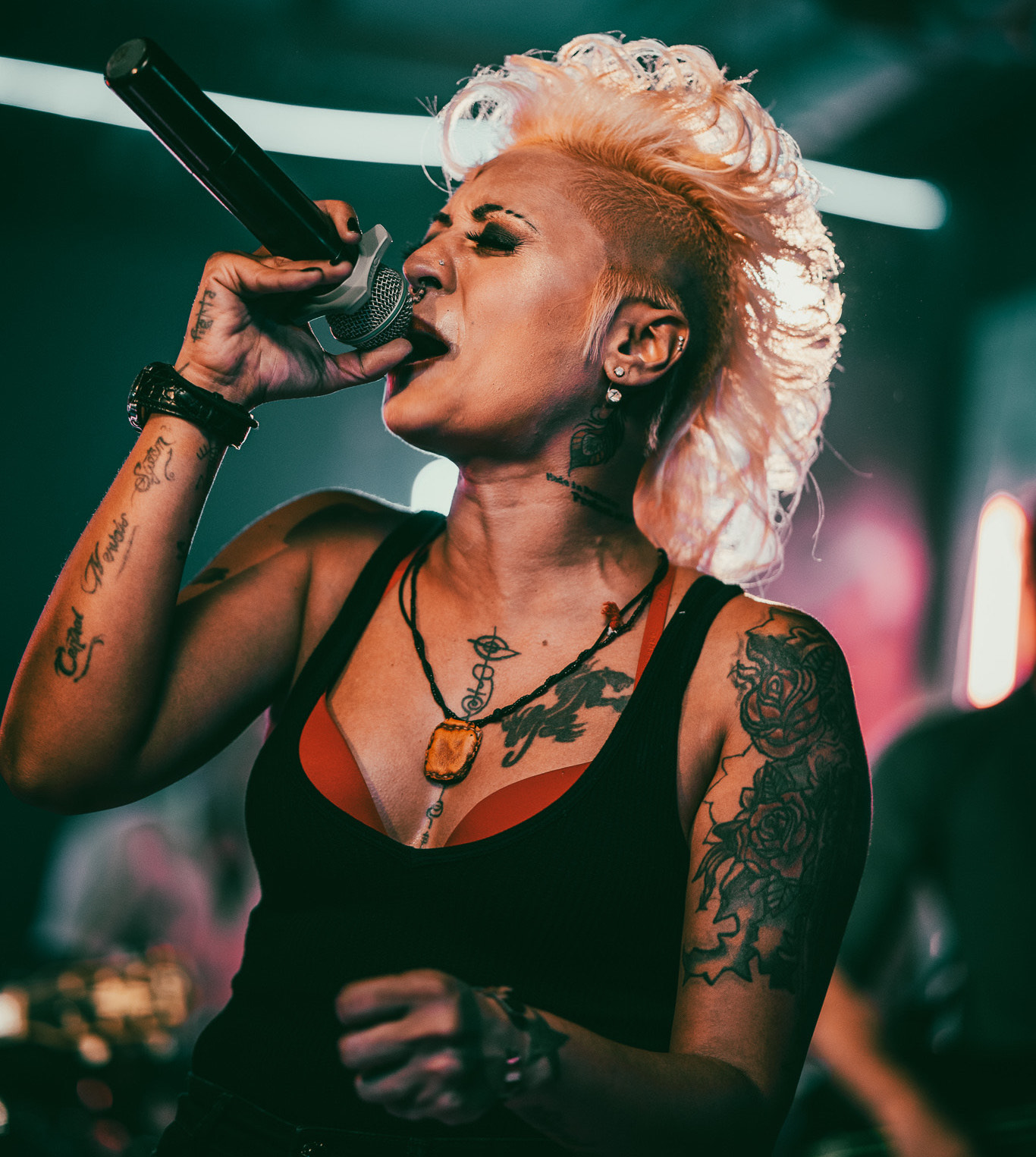
Musician Urvah Khan. Credit: Courtesy of the artist
Looking back at the event, Khan mentions noticing someone standing by themselves in the audience who had burst into tears. “It’s really hard coming to an event by yourself. Especially an event like Muslim Pride, because there could be so much baggage attached to just acknowledging yourself, or venturing out into a new space,” Khan says. “I wish I hadn’t been preoccupied with running the show because I would have gone over and talked to them.”
The next day, Khan searched through new Instagram followers on her personal account and the event page to see if she could find this person. “I just wanted to make sure they were okay. And that they had support. And I wanted to tell them that it takes a lot of courage to come to an event like this by yourself, and just make sure they know they’re not alone.”
According to Khan, some attendees even compared the event to Eid celebrations, drawing parallels to holiday rituals like dressing up and meeting and greeting people in the community. “The fact is that it’s in us, because we lived being a Muslim,” she says.
Khan’s compassion here mirrors the broader mission of queer Muslim community organizers, to create a space where courage is celebrated, where no one feels isolated and where the intricate dance of intersecting identities can unfold without fear. In fact, the journey of the queer Muslim community in Canada doesn’t exist in isolation; it is shaped by a historical continuum of advocacy and support.
It’s been over a year since the closure of Salaam Canada, one of the country’s first advocacy and support groups for queer Muslim people. In operation since the early 1990s, the organization shut its doors in August 2022 during COVID-19 lockdowns, unable to sustain what was largely a volunteer-run labour of love.
And while the organization was foundational to many of the support groups and events that exist today, it’s refreshing to see that Salaam’s closure did not result in community leaders suddenly scrambling to pull something together ad hoc. To me it shows that the queer-Muslim community has become a self-sustaining ecosystem. Queer Muslims in Canada are taking initiative and doing the necessary work. It’s a posture best reflected in a line from Khan: “I just know that if the work is to heal hurt queer Muslims, then I’m here, because I’m a hurt queer Muslim.”
In the face of systemic Islamophobia and homophobia, the heart of queer-inclusive Muslim spaces is in the conviction that our multiplicity, and seemingly oxymoronic identity, is exactly why we belong.
And now, this intersectional foundation empowers individuals like Rahman to assert with confidence, “I understand Islam as being at the core of actively resisting systems of oppression, of standing in solidarity with those who are oppressed and being able to work through those systems.”
I think back to that person whom Khan saw burst into tears at the Muslim Pride event. To them and the countless other young Muslims newly discovering their queerness, Ali affirms: “Everything that you are is completely precious. Whatever others have taught you about faith, is their faith. Whatever they were telling you, it was whatever was going on within them. Your relationship with your faith is entirely yours, and you get to decide it.”
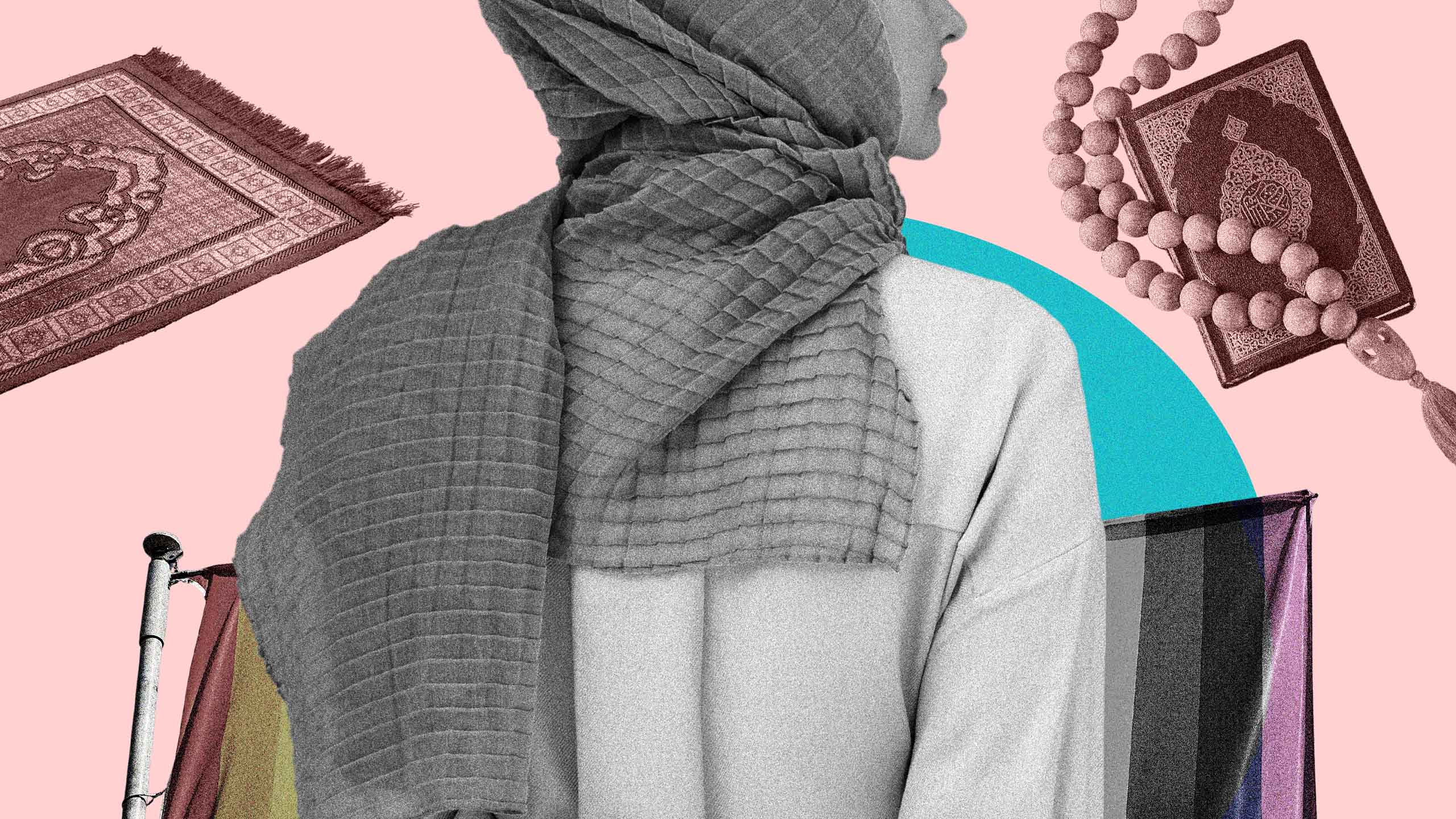
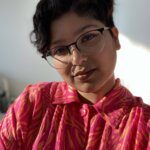
 Why you can trust Xtra
Why you can trust Xtra